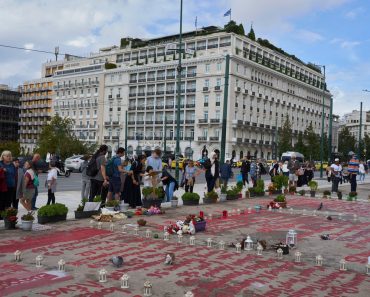Dionysis Savvopoulos, a towering figure in Greek music and culture whose career spanned more than six decades, has died at the age of 81. His death was announced by his family on his official social media account Tuesday night, following a recent hospitalization and a long battle with cancer. Initial reports, as cited by Greek City Times and Greek Reporter, indicate that Savvopoulos died of heart failure or cardiac arrest. The loss of “Nionios,” as he was affectionately known, has prompted a wave of tributes from across Greece’s political, artistic, and intellectual communities.
Born in Thessaloniki on December 2, 1944, Savvopoulos grew up in a family with roots tracing back to Constantinople and Philippopolis. These influences would later infuse his music with a unique blend of Western rock and folk traditions, Macedonian folk, and Greek popular music. According to Ekathimerini, he began his academic journey at the Law School of Aristotle University of Thessaloniki, but his passion for music soon took precedence. In 1963, he made the pivotal decision to leave his studies and relocate to Athens, where he would dedicate himself fully to his art.
By 1964, Savvopoulos had already started to make waves in the Greek music scene, performing in small clubs in Athens. His debut album, Fortigo (“Truck”), released in 1966, became a major success and marked the beginning of a remarkable career. He followed this with The Fool’s Garden in 1969 and The Dirty Bread in 1972. These albums, released during the tumultuous years of the Greek military dictatorship (1967–1974), combined political commentary, rock influences, and Greek folk idioms, quickly propelling him to national fame.
Savvopoulos’ lyrics were often allegorical, deeply poetic, and unapologetically political. His songs became anthems of resistance for youths and dissidents during the junta. As Ekathimerini reports, he was imprisoned twice by the regime, in August and September of 1967, for his anti-establishment themes and outspoken political views. Despite these hardships, he continued to produce music that resonated with the spirit of questioning and defiance, solidifying his role as one of Greece’s leading voices of artistic dissent.
Throughout his career, Savvopoulos collaborated with other icons of Greek music, including Maria Farantouri and Manos Loizos. His style was distinctive, blending influences from American artists such as Bob Dylan and Frank Zappa with the sounds and rhythms of Greek and Macedonian folk traditions. This eclecticism, as noted by Greek City Times, helped him forge a musical identity that was both innovative and deeply rooted in Greek cultural heritage.
In addition to his achievements in music, Savvopoulos made significant contributions to Greek television. From 1986 to 1987, he hosted the show Long Live Greek Song (Zito to Elliniko Tragoudi), which celebrated and promoted Greek musicians and songwriters. This endeavor further cemented his influence on the nation’s cultural landscape.
His personal life was closely intertwined with his art. He was married to Aspasia Arapidou—known as Aspa—who was often referenced in his songs and performances. Together, they had two sons, Kornelios (born 1968) and Romanos (born 1972), and two grandsons, Dionysis and Andreas. According to Greek Reporter, family was a recurring theme in his work, and his relationships provided both inspiration and support throughout his life.
Savvopoulos’ impact on Greek culture did not go unrecognized. In 2017, the Department of Philology at Aristotle University of Thessaloniki awarded him an honorary doctorate, acknowledging his immense contributions to Greek letters and the arts. The ceremony, held on November 24, highlighted his role in shaping modern Greek musical identity and his enduring influence on generations of artists.
As Ekathimerini recounts, Savvopoulos was not only a gifted songwriter and lyricist but also a remarkable stage performer. He continued to enchant audiences of all ages with his music and storytelling, performing live as recently as the summer of 2025 at a festival on the outskirts of Athens. His autobiography, Why The Years Fly By, published in early 2025, offered a candid look at his life, career, and his battle with lung cancer, which he was diagnosed with in 2020. In a television interview, he reflected, “Death is an unacceptable thing. But once you accept it, that’s when you begin living.”
The outpouring of grief and admiration following his death speaks volumes about his place in Greek society. Prime Minister Kyriakos Mitsotakis posted, “I don’t want to believe it, but our Dionysis is no longer here. Savvopoulos is gone, leaving behind a strong imprint on music, on lyrics and on public style. Because with his work and stance, he proved that he was a wonderful songwriter. A sensitive Greek.” President Konstantinos Tasoulas praised him as “a great artist, a remarkable man who was loved by the Greek people for his personality, his work and his contribution to art. Uncompromising, innovative and daring, he embodied the spirit of questioning in the most sensitive and poetic way through works that marked the history of Greek song and became landmarks in the modern culture of our country.”
Savvopoulos’ music was deeply intertwined with the social and political currents of Greece. His songs, with their blend of humor, romance, and biting satire, captured the evolving soul of the nation from the post-dictatorship era to the present day. Albums like Fortigo, The Fool’s Garden, and The Dirty Bread remain touchstones for understanding Greece’s cultural and political transformation over the past half-century. In 1997, he released The Hotel, an album dedicated to artists who inspired him, including Bob Dylan, Nick Cave, Jethro Tull, Van Morrison, Lou Reed, and Lucio Dalla, underscoring his global perspective and eclectic taste.
Even as he battled illness, Savvopoulos remained active, continuing to perform and engage with fans. His resilience and dedication to his craft inspired both his contemporaries and younger generations of musicians. The details of his funeral arrangements were to be announced by his family in the days following his death.
Dionysis Savvopoulos leaves behind a legacy that is as complex as it is profound. His voice, poetic language, and unwavering social insight have ensured that his influence will echo through the soundscape and conscience of Greece for years to come.






